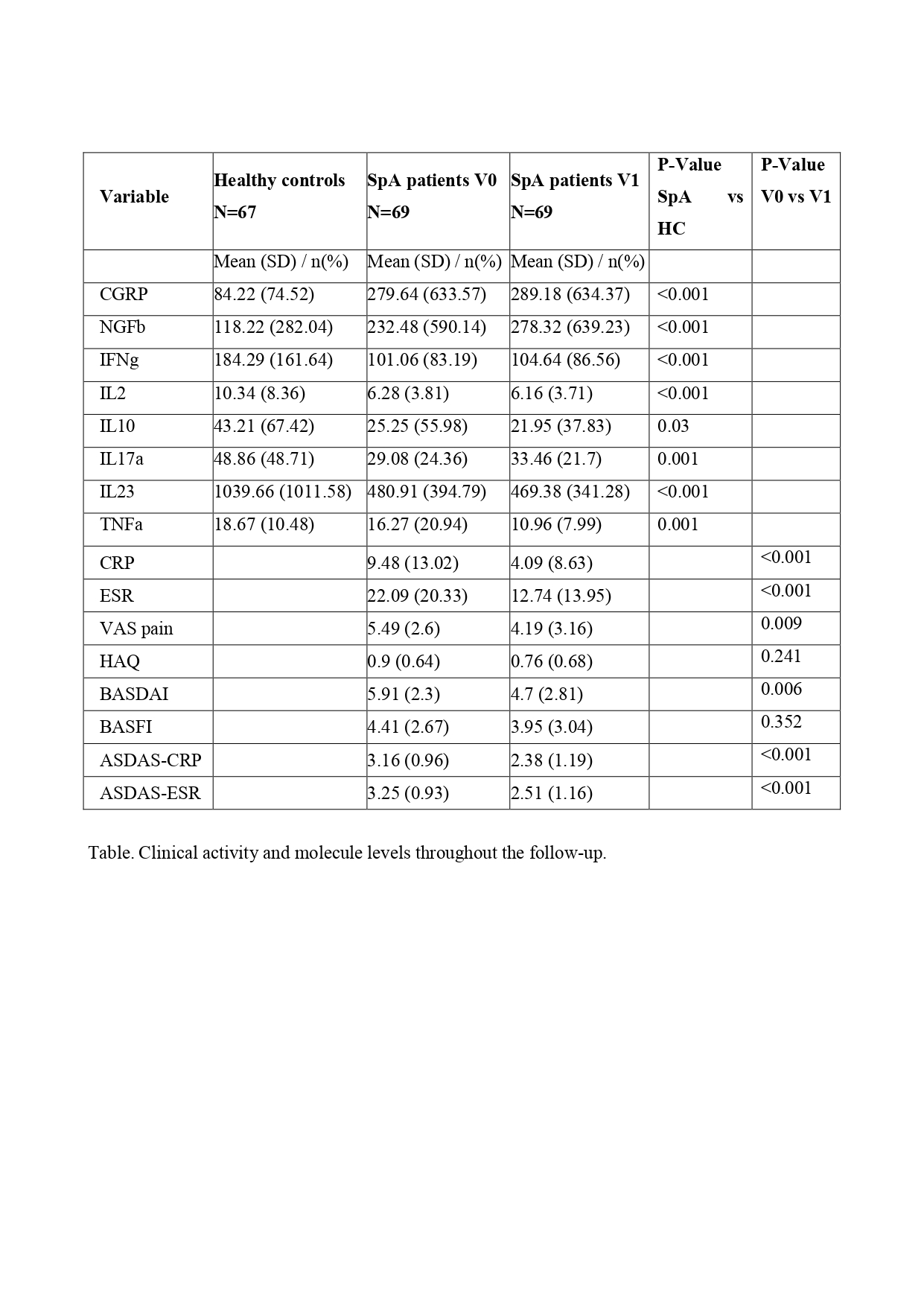Session Information
Session Type: Poster Session C
Session Time: 10:30AM-12:30PM
Background/Purpose: NGFβ and CGRP are neuropeptides with a significant role in peripheral inflammation, pain modulation and immune responses. Neuropeptides regulatory mechanisms in spondyloarthritis (SpA) remain poorly characterized, however, they may influence inflammatory processes indirectly through immune system modulation. Notably, their interaction with cytokines may contribute to chronic inflammation and heightened pain sensitivity observed in SpA.Aim: to evaluate the association of NGFβ and CGRP serum levels with nociception, immune system modulation and clinical Spa activity.
Methods: A longitudinal, observational prospective study with evaluations at baseline and 2 months follow-up in SpA patients initiating biological therapy (BT) was performed. In SpA patients complete laboratory test, BASFI, BASDAI, HAQ and VAS pain scale and ASDAS score in each visit was carried out. We analyzed by colorimetric methods cytokine (TNFa, IFNg, IL2, IL10, IL17a and IL23) and neuropeptide (CGRP and NGFb) serum levels in SpA patients and in healthy controls (HC).
Results: 69 SpA patients (65.2% male) were recruited with a mean age of 48 (12) years and a mean time of disease evolution of 7 (8) years. 67 HC with a mean age of 45 (13) years (43.2% male) were also recruited. At baseline the 39.1% of patients showed elevation of CRP and the 21.7% ESR. The 86.9% displayed high/very high clinical activity by ASDAS score. The 66.7% were under anti-TNF therapy and 33.3% under anti-IL17 treatment, the 31.9% with previous BT administered, 21.7% treated with DMARDs and 4.4% with corticoids. There are significant differences in the analyzed molecules levels between patients and HC (table). Age and sex do not appear to influence molecule levels. CGRP and NGFb showed no correlation and no differences during the follow-up. No association between neuropeptide levels and clinical activity was found, but a tendency where incremented CGRP was associated to low HAQ (P=0.06) and incremented NGFb was associated to low pain perception (P=0.06) was observed. Analyzing the neuropeptides influence on cytokines, high CGRP and NGFb levels were related to high IL10 levels (P=0.047 and P=0.005) and low IL2 levels (P=0.003 and P=0.025). Moreover high CGRP was associated to low IFNg (P=0.002). Differences in cytokine levels during the follow-up were only seen for IL17a (P=0.003) and TNFa (P< 0.001), as well as a decrease of CRP and ESR levels (P< 0.001), VAS pain (P=0.009), BASDAI (P=0.006) and ASDAS score (P< 0.001). Clinical activity was associated to IFNg (P=0.038) and IL17a (P=0.005) levels, and elevated ESR with high IL2 (P=0.019). Related to BT, patients treated with anti-TNF showed low TNF levels (P=0.006) and those treated with anti-IL17 showed low IL17a levels (P=0.008).
Conclusion: Our findings indicate that neuropeptide levels were higher in SpA patients than in HC. A tendency of a decrease in pain and disability perception with high neuropeptide levels was observed, probably due to neuropeptides have been depleted from the presynaptic terminal and secreted into the bloodstream. Although no association between neuropeptides and clinical disease activity was observed, indirect influence on clinical activity is highlighted with the downregulation of IL2 and IFNg.
To cite this abstract in AMA style:
GRAU GARCIA E, LEAL S, Ivorra Cortes J, Muñoz-Martínez P, Mas Sanchez L, Ramos Castro D, Torrat Noves A, Alcantara Alvarez I, Villanueva Manes B, Simeo Vinaixa M, Perez Hurtado A, Andrés Román Ivorra J. Neuropeptide influence in nociception and inflammation through immune system modulation in SPA patients [abstract]. Arthritis Rheumatol. 2025; 77 (suppl 9). https://acrabstracts.org/abstract/neuropeptide-influence-in-nociception-and-inflammation-through-immune-system-modulation-in-spa-patients/. Accessed .« Back to ACR Convergence 2025
ACR Meeting Abstracts - https://acrabstracts.org/abstract/neuropeptide-influence-in-nociception-and-inflammation-through-immune-system-modulation-in-spa-patients/

